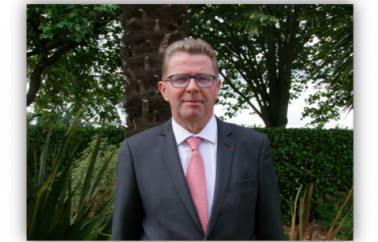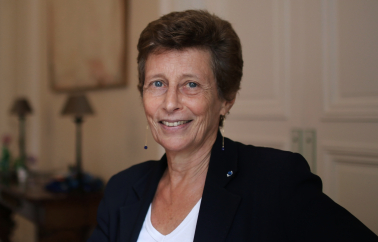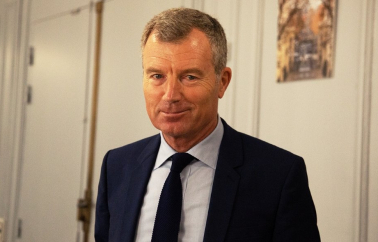
Introduction to Working Group C "Impact on economic and social policies" - by Gérard Gavory, Prefect of Vendée, France
Study on the impacts of the conflict in Ukraine
Malmö - April 14, 2023
Introduction of the Working Group C
Mr. Gérard GAVORY, Prefect of Vendée (France)
Impact on economic and social policies (supply of energy resources and agricultural products, tourism policy and freedom of international movement, internal social climate)
The war that broke out in Ukraine in February 2022 is a major geopolitical event. As such, it challenges previous balances, not just in the sphere of international relations; it has significant impacts on economic balances, both globally and locally, as closely as possible to the lives of our fellow citizens, businesses and public services.
It is an opportunity for a collective awareness of our dependencies, as States and as end users, vis-à-vis third countries, for essential raw materials.
We naturally think of energy: the European Union does not produce oil, and gas extraction is only significant in the periphery, whether it is the North Sea (United Kingdom, Norway) , North Africa (Algeria), or Russia. Although gas market prices have returned to their level before the start of the war in Ukraine, the weakening effect remains strong on the companies that were led to conclude contracts during the period of the highest prices. This episode is also an opportunity to re-examine the electricity pricing mechanism within the European Union, a mechanism that has caused controversy in France; the Commission has also begun to formulate proposals for reform.
The food shortages following the start of the conflict were much more surprising, especially for a country like France which, since the post-Second World War, thinks of itself as self-sufficient in agriculture. The problem of sunflower oil, with these supermarket shelves empty for several weeks, shocked public opinion. The shortages are also further upstream in the agricultural production chain, with a very large share of fertilizers coming from factories located in Ukraine and Russia.
In terms of industry, analysts agree on the finding of a loss of competitiveness on a European scale. This phenomenon could hamper the overall movement of fragmentation of globalization, characterized by the return of certain productions to European territory, i.e. in greater proximity between the stages of production and the final consumer.
Finally, in terms of major macroeconomic indicators, the most notable phenomenon remains the return to high inflation, the contraction of GDP having been avoided, with the exception of Sweden, in 2022. If the Euro has been, according to economists, rather protective, it is clear that some Euro-zone States are more affected than others, which is not without causing difficulties on the social level, the rise in prices is not accompanied by a general increase in wages. The nature of this inflation and the measures taken to reduce it are also not without consequences for households and certain key economic sectors: the rise in key ECB rates has a direct impact on the real estate sector; persistent inflation, which concerns services, in particular the hotel and catering industry, could have a recessive effect on tourism.
It is true that the war in Ukraine is not the only major factor explaining the current economic upheavals.
The recovery following the health crisis explains a large part of the resumption of inflation that all European states are experiencing, albeit at different levels. The problem of food shortages and rising food prices can also be explained by climatic factors, such as the heat dome in Canada during the summer of 2021 which caused a drop in mustard production or the drought in France in 2022, at the cause of lower yields. The health dimension is not absent: I could, in another context, tell you about the avian flu epizootic which hit the west of France hard, particularly the Vendée, causing there too shortages and increases prices for eggs and poultry.
It is arguably for scholars to isolate what follows from one or another economic causal factor; phenomena of speculation or reconstitution of the margins of intermediaries would also be involved. With regard to our exchanges of the day, it seems clear to me that our fellow citizens, whatever our country of origin, attribute to the war in Ukraine the main part of the explanation for the rise in food prices and even more for the energy.
In the field, we can discuss the impacts observed and their social repercussions.
- With regard to energy prices, the rise in bills is putting households and many businesses in difficulty, despite the shock-absorbing mechanisms put in place by our respective governments; the challenge is then to avoid fuel poverty, situations of cessation of payment or even business bankruptcies, which would cause a slowdown in activity and an increase in unemployment. In addition to the measures taken for energy sobriety which have contributed to reducing our consumption (in France: – 20 tWh, i.e. – 9% excluding weather effects), electricity and gas load shedding plans have been prepared. (The delegation of the Canton of Vaud as well as Christian de Boisdeffre make several contributions on this topic.) Energy supply and the measures taken constitute the priority topic of the Swedish Presidency of the European Union.
- In terms of food, the rise in prices is also weakening the situation of individuals and companies in the sector, which are also faced with supply disruptions. The lack of repercussions of these price increases on farmers incomes also poses a problem, with the acceleration of the fundamental movement to reduce the number of farmers and a new development of the anger of the agricultural world, which, it is true, finds for the moment other subjects of crystallization. (Pascale Trimbach will shed light on agricultural issues.)
To take the particular case of France, it is likely that these tensions on purchasing power contribute to the level reached by social protest around the pension reform, by lowering the collective capacity to accommodate a structural reform of this type; which generates problems of public finances, governance and public order that come on top of the strictly social issues.
For the reflection that will be ours this morning, I suggest that you limit the space to observations, which are essential to found our common reflections, to identify the levers that can be ours, as territorial representatives of the State in Europe, both curatively and prospectively.
In the responsibilities that are ours, we must ensure the protection of the populations, by the implementation of social provisions, which we must make known and make accessible to those who need it most. Protection also through the maintenance of order when economic and social impacts fuel protest movements, but this is the subject of another working group. It is interesting to measure the opinion of the population, in particular of young people living in working-class neighborhoods. (Nicole Isnard will provide an update on the subject.)
More prospectively, I am convinced that our responsibility also consists in taking advantage of this international crisis as a lever to change certain choices of local public policies and companies in our territories.
I think we can help steer the incentives induced by the economic situation in the right direction: the rise in the price of hydrocarbons makes the techniques for producing low-carbon energies more competitive, such as wind, solar and even green hydrogen ; the opinion of a population that receives sharply rising gas and electricity bills can help improve the acceptability of facilities hitherto decried. Another example, gas prices and the symbolic weight of dependence on a hostile power can encourage the development of the methanization of organic, agricultural or household waste, i.e. play the role of trigger for public investments and private.
In order to complete this general introduction to our work, I suggest that our colleagues share their contribution to the diagnosis of the economic and social impacts of the war in Ukraine.



